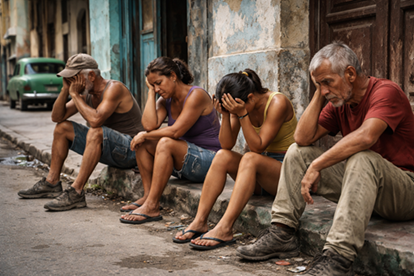
The following is a speech delivered in my capacity as keynote speaker at the annual Future Leaders of Tourism Conference held at The University of the West Indies, Mona Campus on Thursday, November 23, 2023. I am urged to have this speech published with the viewpoint that higher education institutions do have a responsibility in supporting climate action through their curriculum.
I commend you, students, for hosting this event as a part of your class activities and demonstrating your appreciation of green investments in tourism. You went on even further with the theme of today’s event…. “Accelerating Green Investment for Sustainable Tourism Development”. This is huge! This is your collective movement to speak to all tourism stakeholders to enable as well as maintain this industry’s sustainability.
Notably, your mission as Future Leaders of Tourism is to “unite influential experts and forward-thinking individuals in the tourism industry to facilitate the exchange of ideas, foster innovation and influence the direction of sustainable tourism development”. A big congratulation to you for your efforts as Future Tourism Leaders. I am most heartened and pleased about the future of tourism.
This leads me to the point that higher education institutions have a responsible role to play in “Accelerating Green Investment for Sustainable Tourism Development”. The inclusion of this learning outcome in the curriculum is paramount; having a palpable impact like what is being demonstrated by this class activity and by you the students; the future leaders of tourism. This is highly commendable. Sensitizing all tourism stakeholders about green investments for tourism is a part of the responsible tourism initiatives of all educational institutions of higher learning. I am most grateful to your lecturers for their insight in transforming the ways students learn and experience sustainable tourism development.
You have joined the other global initiatives that are driving green investments in tourism. These include the initiatives of the United Nations World Tourism Organization (UNWTO) which themed this year’s World Tourism Day 2023 celebration as “Tourism and Green Investments”, targeting investments for people, planet and prosperity. The 8th World Investment Forum held in Abu Dhabi between October 16th and 20th this year, also included tourism for sustainable development with an emphasis on “Accelerating Green Investment for Sustainable Tourism Development”.
So, I have been talking about green investments, but do we really understand this terminology or concept, and its premises and principles? Carbon Collective (2023) states that green investment allows for the allocation of financial resources to projects or companies that focus on sustainable practices, environmentally friendly technologies, and the conservation of natural resources.
But why do we need green investments in tourism?
Pondering on today’s topic, I recall my chapter publication in the book, Climate Change & 2030 Agenda for Sustainable Development edited by Gonzalez-Perez and Leonard (2017). The chapter is titled, ‘Climate Change and the Hospitality and Tourism Industry in Developing Countries’. The chapter:
- analyzes the phenomenon of climate change in the tourism industry in developing countries and evaluates how the industry is responding to the threats of climate change as well as how they can actually assist in eradicating poverty through its adaptive capacity and sustainable development initiatives to mitigate the impacts of climate change. In other words, investing in and utilizing green technologies in the tourism industry can reduce the impacts of global warming and climate change which result in environmental disasters and thus, this reduction allows for productivity.
- indicates that climate change is a real phenomenon, which has started to impact the hospitality and tourism industry in developing countries and if not mitigated will seriously impact the industry. We have seen the impacts of hurricanes on the industry. For example, hurricanes Irma, Maria and Jose in 2017 caused catastrophic damage to superstructures and infrastructure in the region and halted travel to the impacted countries.
- deduces that the tourism industry has an important role to play mainly because of the industry’s economic and social value, particularly in developing countries that are vulnerable to its effects and to the Caribbean region which is highly dependent on tourism.
- concludes that each developing state has to devise an effective plan of action to mitigate the threats of climate change and this would be in accordance with the 2030 Corporate Agenda for Sustainable Development.
Based on the concerns identified in the chapter and the corresponding recommendations, it is most pleasing to see that there are non-governmental organizations (NGOs) that are driving green investments from which the tourism industry can benefit. These include the Foundation for Environmental Education, Green Growth Asia Foundation, and the Sustainable Development Solutions Network. Also, from a global outlook, research has indicated that China, the USA, Germany, the United Kingdom, France, Japan, India, South Korea, Brazil and Spain are the top ten countries that are engaged in green investments to transform their energy infrastructure to low carbon energy technologies and renewable energy. What is important about this information is that France, Spain and the USA are the three most visited destinations in recent times.
In 2021, they respectively had 48.4 million, 31.2 million and 22.1 million tourists arriving at their destinations. It is likely that these three top tourist destinations that are among the top 10 countries that have invested in green technologies have ventured into green investments for tourism.
For us here in the Caribbean, the Caribbean Centre for Renewable Energy and Energy Efficiency (CCREEE) which is an arm of CARICOM, has the mandate to promote renewable energy and energy efficiency investments in the region. They do so by improving access to modern, affordable and reliable energy services, energy security and mitigation of negative externalities of the energy system (e.g. local pollution and greenhouse gas emissions).
Specific to tourism, the Caribbean Tourism Organization (CTO) has been encouraging tourism stakeholders to embrace green investments and sustainable practices to benefit future generations. Countries such as Dominica, Grenada, Montserrat, St. Kitts and Nevis, St. Lucia, and St. Vincent and the Grenadines have implemented green infrastructure in terms of renewable energy sources and in particular, Dominica has been constructing climate resilient infrastructure. The tourism industry will benefit from all these greening initiatives.
However, more regional and national initiatives are desirous to encourage and strengthen green investments in tourism.
The message here is that green investments in tourism are to be accelerated at all levels for global, regional, national and local economic growth and productivity.
There can be no trade off. This is a call for a low carbon and a climate resilient tourism industry.
I am very happy to see that at the recent and first CARICOM-Saudi Arabia Summit held in Riyadh, that Saudi Arabia is desirous of combatting climate change and achieving environmental sustainability as it ventures into tourism as an export market.
It is most evident that sustainable pathways are required to combat the issues of climate change and global warming. With tourism contributing approximately 4 per cent to the global economy (pre-COVID-19 pandemic), it is important to transform this economic activity to a sustainable industry by not only identifying financing pathways or opportunities but ways in which all tourism stakeholders can be a part of this initiative. According to Sustainability Hospitality Alliance, hotels that prioritize sustainability can reduce their operating cost by up to 30% and this includes lower utility bills and lower waste management costs. They also benefit from improved employee productivity.
A 2021 survey with small and medium business operators in the USA shows that green business practices can drive cost savings. The result shows that 22% of the respondents saved money, 20% saved energy, 13% benefited from reputation management, 11% respectively responded that it helped them to keep up with competition and, retaining and motivating employees, 8% reported that it helped them to develop green products as well as reduce pressure from customers and 7% of the respondents derived opportunities for new markets.
Green investments in tourism therefore make good financial sense. This underscores the need to invest in green buildings, in new technological solutions to decarbonize the operations within the industry so as togenerate clean air, to use alternate energy technology such as wind energy and solar energy, to engage in activities targeted at pollution control, to have smart grid technologies, energy storage solutions, waste management and recycling systems.
Green investments also go beyond these approaches mentioned to include socially responsible investment and should be carried out in an ethical way. Green investment is not simply for tourism entities to raise funds for branding purposes. It is certainly not for greenwashing where they claim that they are doing things to improve or protect the environment. Green investment is for these operations to be serious about combating climate change, promoting sustainable development and upholding high ethical standards. If we are serious about green investments in Caribbean tourism, there may be the need for a ‘watchdog’ to prevent greenwashing in the destination. There ought to be regulations to prevent tourism entities from creating and acting on misleading information.
Is green investment far-fetched?
Some may see it as a wish list. This is because it requires will power, commitment and financial resources from all stakeholders including government. My view is that it need not only be green financial investments by way of private equity funds, venture capital, and mutual funds and bonds among the other financial facilities that are recommended to fund these initiatives but by way of the socio-cultural and environmental practices even in the smallest way, for example, instituting and practising the 3Rs — reduce, reuse and recycle; disposing of garbage for proper collection and further disposal by the municipality; saving on paper among other low hanging fruits.
This is a call for the Caribbean Hotel and Tourism Association to play a serious role in green investments with targeted outcomes for its members and the same call is being made to the local body, Jamaica Hotel and Tourist Association. This is also a call for the Ministry of Tourism to push for green investments in the industry to further position the destination as environmentally focused. Entities such as the Inter-American Development Bank, the Caribbean Development Bank and the Development Bank of Jamaica are being called upon to have serious considerations regarding funding for green investments by tourism entities, particularly the small and medium tourisms enterprises.
I end this short presentation, by further calling on you… the future leaders of tourism, to remain a part of the interconnectedness and transformative change. Be included in the reinforcement for new thinking to change the mindsets of government and tourism business operators. This is also a regional and global call for the willpower to save the natural environment on which tourism depends. Let us all be a part of the change makers who address sustainability for our future generations by investing in green tourism initiatives.
As an educator, I am of the strong view that higher education institutions have a strong role to play in climate action by way of fora such as this one as well as the incorporation of this important matter in their curriculum. Climate action to save planet earth for future generations is everybody business!
Gaunette Sinclair-Maragh is Professor, Tourism Development and Management at the University of Technology, Jamaica



